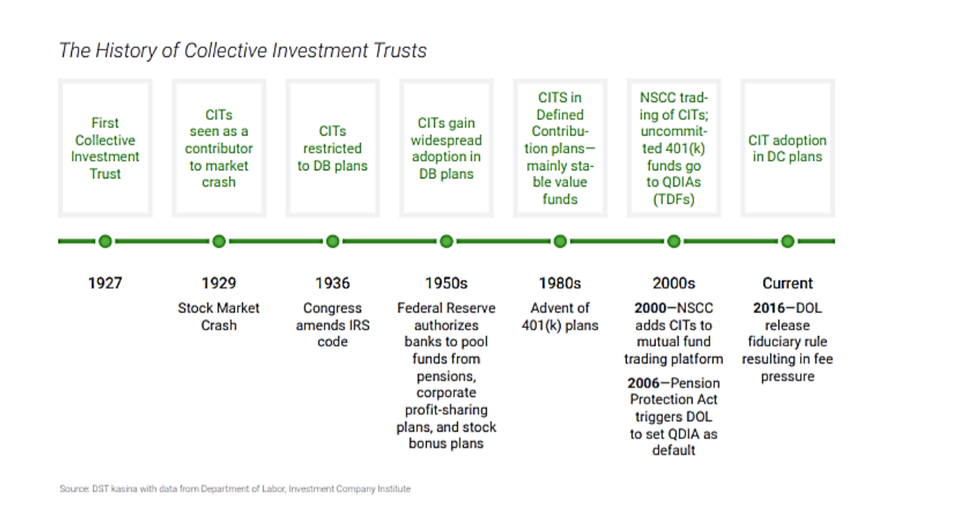Collective Investment Trusts — The Fastest Growing Investment Vehicle Within 401(k) Plans
For almost a century, collective investment trusts (CITs) have played an important role in the markets. They were originally introduced in 1927. According to a 2020 study, they are now used in more than 70 percent of plans.¹
For the vast majority of their existence, CITs were available only in defined benefit (DB) plans. In 1936, CIT use expanded in DB plans when Congress amended the Internal Revenue Code to provide tax-exempt (deferred) status to CITs. CITs then gained widespread adoption in the 1950s when the Federal Reserve authorized banks to pool together funds from pensions, corporate profit-sharing plans and stock bonus plans. The IRS also granted these plans tax-exempt status.
In the 1980s, 401(k) plans became primary retirement plans and mutual funds became the primary investment vehicle, due to daily valuation. In the 2000s, CITs gained significant traction in defined contribution (DC) plans due to increased ease of use, daily valuation and availability. During this time, CITs were also named as a type of investment that qualifies as a qualified default investment alternative (QDIA) under the Pension Protection Act of 2006.

- Lower operational and marketing expenses
- A more controlled trading structure compared to mutual funds
- They’re exempt from registration with SEC, thereby avoiding costly registration fees
Contact
Ironwood Retirement Plan Consultants
Office: 661-735-1558
Fax: 661-840-5571
5060 California Avenue, Suite 600
Bakersfield, CA 93309
Subscribe to our newsletter
We will get back to you as soon as possible.
Please try again later.
Securities offered through Purshe Kaplan Sterling Investments, Member FINRA/SIPC., Headquartered at 18 Corporate Woods Blvd., Albany, NY 12211. Purshe Kaplan Sterling Investments and Barnes Wealth Management Group are not affiliated companies. Not FDIC insured. Not bank guaranteed. May lose value, including loss of principal. Not insured by any state or federal agency
The Purshe Kaplan Sterling Investments representative associated with this website may discuss and/or transact securities business only with residents of the following states: California (CA), Michigan (MI), Oklahoma (OK), Oregon (OR), and Pennsylvania (PA).
Copyright 2022 Ironwood Retirement Plan Consultants
